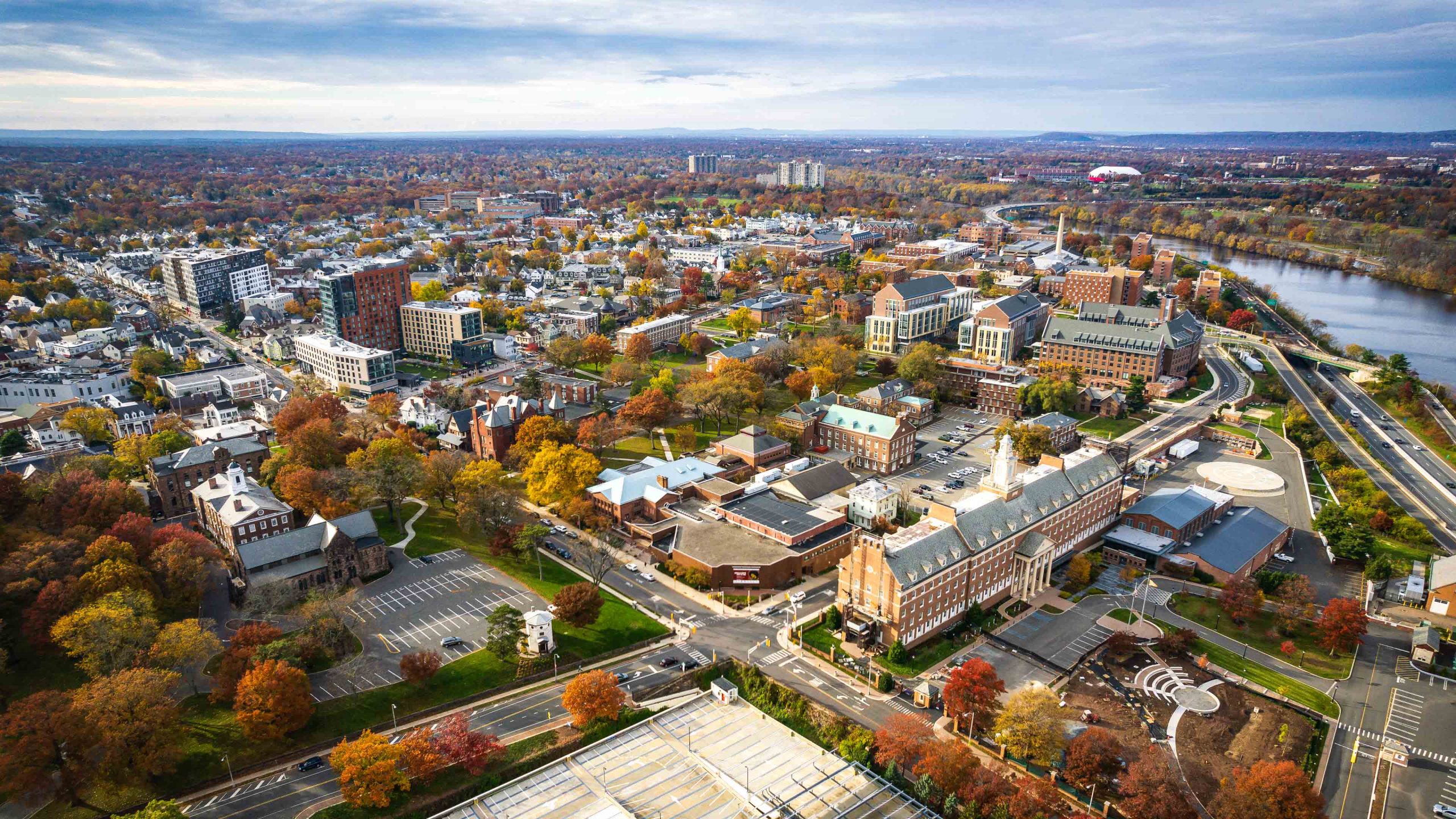Urban Planning Joint and Dual Degrees
Joint Master’s degree programs enable students to complete two degrees simultaneously. A dual degree expands career opportunities, often providing a unique set of skills and experiences.
Within the urban planning program, the Bloustein School offers joint degrees with both the public policy and public informatics master’s programs, as well as an accelerated option for exemplary undergraduates. Dual degree programs are also offered in conjunction with other schools and departments at Rutgers University, including business, law, and food and business economics. A dual degree in infrastructure planning, offered with New Jersey Institute of Technology, provides a broad professional education intended to draw students from architecture, engineering, and the social sciences.
The scheduled time frame for the completion of a joint Master’s degree is usually shorter than what it would be to complete both degrees individually. In almost all cases, students must apply and be accepted to each degree program independently. Typically, dual degree programs are completed as part of full-time study.
Allied with Urban Planning is the school-wide PhD program, which focuses on the preparation of planning- and policy-focused scholars who will teach and conduct research.
Urban Planning and Public Policy (MCRP/MPP)
Combining the Bloustein School’s Master of City and Regional Planning (MCRP) and Master of Public Policy (MPP) leads to a three-year dual degree option. Students are accepted independently to both graduate programs after providing a separate application to each, but share concentrations, course electives, and requirements.
The three year, 72 credit dual degree program is a saving of 24 credits compared to earning the 48-credit MCRP and the 48-credit MPP degrees separately. Students are required to take four methods courses, spanning the core courses in both programs. The required methods courses are Basic Quantitative Methods, Research Design, Planning Methods, and Applied Multivariate Methods. If a student places out of Basic Quantitative Methods, they must take another methods course to complete the 12 credits. Methods courses beyond the 12 minimum credits are permitted and count as electives or concentration courses.
Urban Planning and Public Informatics (MCRP/MPI)
Combining the Bloustein School’s Master of City and Regional Planning (MCRP) and Master of Public Informatics (MPI) leads to a three-year dual degree option. Admission to the dual MCRP/MPI degree program is highly selective and requires simultaneous, separate applications to and acceptance by each program. A total of 60 credits must be completed in a minimum of three years of full-time study.
There are different possible course plans that would meet the dual degree requirements and students may begin the dual degree in either program or pursue both simultaneously. The MCRP degree requires a set of core, concentration and elective course which may be found here. Dual degree students starting in the MCRP must complete 12 MPI-eligible credits beyond their 48-credit requirement for the MCRP, totaling 60 credits. The MPI degree requires 30 credits of core courses and 6 credits of electives. Dual degree students starting in the MPI must complete complete 24 MCRP-eligible credits beyond their 36-credit requirement for the MPI degree, totaling 60 credits.
Rutgers Law School (MCRP/JD)
The Rutgers Law Schools at Camden and Newark and the Bloustein School offer a dual-degree program designed for students who are interested in law, politics, and public policy.
A four-year course of study, this program leads to the master of city and regional planning and Juris Doctor (MCRP/JD) degrees offered by the Bloustein School and the law schools at the Newark and Camden campuses of Rutgers. Two and a half years are spent at the law school and one and a half years in the planning program. Students are accepted independently for both graduate professional programs after separate application to each.
Rutgers Business School (MCRP/MBA)
In 2004, the Bloustein School and the Rutgers Business School: Graduate Programs-Newark and New Brunswick developed the implementation of a dual master of city and regional planning and master of business administration degree program (MCRP/MBA). The Bloustein School’s planning program offers a broad array of courses in such areas as housing, transportation, community development, environment, urban and regional economics, and information technology, as well as concentrations in several specialized areas.
The 84-credit dual MCRP/MBA degree program can be completed in three years of full-time study. The total of 108 credits that would be required to obtain the two degrees separately (48 for MCRP and 60 for the MBA) is thus reduced by 24 credits (12 credits each way), and the time from four to three years. The dual degree combines the complementary strengths of the two programs and provides a broad professional education ranging from city and regional policy planning to business administration and management. It is intended to produce professionals who will make meaningful contributions to the improvement of cities and regions with a full foundation of business principles.
New Jersey Institute of Technology (MCRP/MIP)
To expand educational opportunities in the urban planning field, an agreement between the Bloustein School and the New Jersey Institute of Technology (NJIT) implemented a dual master of city and regional planning and master in infrastructure planning degree program (MCRP/MIP). The Bloustein School’s planning program offers a broad array of courses in such areas as housing, transportation, community development, environment, urban and regional economics, and information technology, as well as concentrations in several specialized areas. The MCRP degree is fully accredited and widely recognized.

Urban Planning and Food & Business Economics (MCRP or MCRS / MS)
The dual degree leads to either a master of city and regional planning (MCRP) degree or a master of city and regional studies (MCRS) degree in urban planning and policy development and a master of science (MS) degree in food and business economics. Students are accepted independently for each graduate program after separate application. Students must meet the degree requirements of each program; however, with proper course selection, 9 credits of coursework from each program may be applied to the other degree, thus reducing by one and one-half semesters the length of time required to obtain the two degrees.
Joint BA or BS and Master of City and Regional Planning Program
The Bloustein School, in cooperation with the School of Arts and Sciences and the School of Environmental and Biological Sciences, offers a joint program that enables students to earn the bachelor of arts or science and the Master of City and Regional Planning in five years rather than the normal six. This (3-1-1) five-year program gives exemplary students the opportunity to complete their liberal arts education and prepare themselves for a career in urban planning and development.






